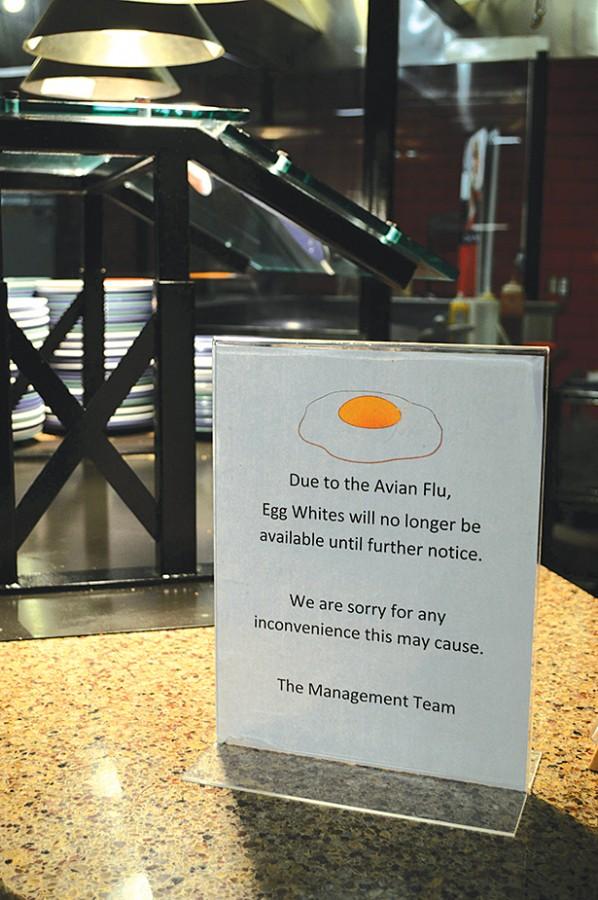Avian Flu Leaves Students To Go Cold Turkey
Above, a sign found in the Metz Dinning hall alerting students that egg whites will no longer be available because of the flu.
September 30, 2015
The Avian Influenza Virus is affecting Metz’s ability to receive egg whites and turkey meat from its number one producer, US Food Services.
“The Avian Flu is something that happens occasionally. This time, it happened in some of the biggest turkey and chicken producing states in the country,” said Bruce Deeble, Metz General Manager.
Due to this outbreak, 33 million hens had to be euthanized or were killed by the virus.
According to the US Department of Agriculture, roughly 87 percent of laying hens are stricken with the disease.
One in every five eggs used in the United States comes from Iowa. Tragically, farmers had to wipe out almost 50 percent of their flocks.
“We’re still able to get eggs, but they only allow us so many, so we have to be real careful,” said Deeble.
Deeble said chickens and eggs are going to replenish faster than turkeys, which are also impacted. “From the time a chicken hatches to the time it gets processed, that takes about six weeks. For a turkey, it takes 22 weeks for the same process, so you’re almost looking at half a year,” Deeble said
This is a problem for food services because deli turkey is a high demand item on campus, and it’s going to be harder to get because US Food Services will not be producing turkey until the middle of January.
“Michigan and South Dakota aren’t producing any turkey at all now. We’re still able to get turkey, but only from what has been produced,” said Deeble.
Deeble said that a turkey shortage is something students need to keep in mind.
“We’re hoping that it doesn’t come down to us only having turkey available Monday, Wednesday, and Friday or something like that. It may or may not happen. It’s just something we need to keep
everyone aware of,” said Deeble.
Metz has been stockpiling turkey and freezing it, but the deli turkey can only be purchased in limited quantities at one time.
Egg whites seem to be impossible to get.
“Our number one producer is US Food Services, and we can’t get egg whites. We could probably go and buy a couple of quarts at the local supermarkets but it wouldn’t last very long,” said Deeble.
Kelsey Petroski, second year communications major, feels the university should have notified students about the Bird Flu.
“I feel like the school should have told us about the flu, especially with winter and bad weather coming. I’m a commuter and don’t eat here often, but if you dorm here and don’t have a car how are you supposed to stock up on turkey?” said Petroski.
Stephanie Piser, fourth year medical imaging major, said she learned of it via a sign hanging in the Metz dinning hall.
“I’m not much of a turkey eater. I didn’t know there was a chance of a turkey shortage or really anything about it. I feel like a lot of people don’t know about this,” said Piser.
Caroline Peters, fourth year social work major, also did not know about the Avian Flu outbreak.
“I didn’t even know this was taking place, and I think the turkey shortage would affect many people especially in the cafeteria. I love getting turkey burgers from the grill. I think Metz should find a new place to get their turkey from to make sure it’s healthy, even if it’s more expensive, ” said Peters.
Samantha Wise, third year physical therapy major, said she is already taking precautions.
“I knew this was taking place because of my job. I have whole turkeys and sliced turkey meat frozen in the freezer,” said Wise.
Deeble said his goal is to keep people aware of the shortages.
“We don’t want to scare anyone, we just want everyone to know that there may be shortages in the future,” said Deeble.
To be extra safe, the Center for Disease Control & Prevention advises people to eat only bird meat or products that have been thoroughly cooked, avoid runny eggs and keep cooking temperatures at 165°F (74°C).
According to the USDA, “The USDA has both an international and a domestic role in controlling the spread of Avian Influenza and reducing its effects on both agriculture and public health. USDA is aware of and prepared for the emergence of new types of the virus.”
More information on the Avian Bird Flu can be found at www.cdc.gov and www.usda.gov.







